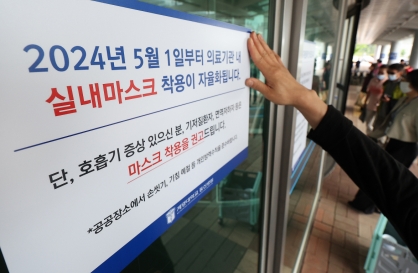Japan's collective self-defense won't lead to military action in S. Korea: Tokyo official
By 옥현주Published : Aug. 31, 2014 - 14:04
Japan's strengthened defense capabilities will not lead to an unauthorized military landing in South Korea, a Japanese foreign ministry official said, addressing neighboring countries' concerns over his country's recent rearmament moves.
After years of preparations, Japan's Cabinet approved on July 1 a reinterpretation of the country's constitution to increase the role of its armed forces, the Self-Defense Forces, allowing it to fight overseas alongside its allies.
It was Japan's major turnaround from its pacifist policy following its defeat in World War II and has drawn deep security concerns from countries victimized by Japan's wartime aggressions,
including South Korea and China. Japan colonized Korea from 1910-1945.
"South Koreans' concerns that Japan, jointly with the U.S., may land in South Korea without permission in an emergency situation are unnecessary. That will never happen regardless of whether it is written or not written in the U.S.-Japan military guidelines," an official from the Japan's foreign ministry said in a meeting with South Korean reporters on Monday. His comments were embargoed until Sunday.
The meeting was held during the reporters' one-week visit to Japan under the South Korea-Japan journalist exchange programs run by the foreign ministries of the two countries.
"In conclusion, Japanese Self-Defense Forces launching attacks on any country will never happen," the official said, speaking on condition of anonymity.
Japan is pushing for a bolstered role for its armed forces in line with the strengthening of the U.S.-Japan military alliance, and this tighter bilateral alliance will also be beneficial to South Korea, the Japanese official said.
Neighbors harbor suspicions that Japan may be attempting to reassert its military presence in Asia, where China's power is increasingly pronounced.
After a summit meeting in Seoul last month, South Korean President Park Geun-hye and Chinese President Xi Jinping had voiced concerns over Japan's cabinet decision.
The Japanese foreign ministry official, well-versed in Tokyo's national security policy, attempted to rebut such concerns, citing Prime Minister Shinzo Abe's catch phrase that portrays Japan's recent military strengthening efforts as "proactive" pacifist.
"Japan's postwar (pacifist) stance remains little changed. It remains as it was. But Japan will pursue more international collaboration instead of just sitting silently," he said.
Under the limits of the pacifist constitution, Japan had been banned from using military force to settle international disputes.
The major goal of the on-going efforts to reinterpret the constitution is devising the system necessary for securing the safety of the Japanese people as well as "proactively" participating in activities for international peace and security, the official said.
Japan will fully explain its stance to neighboring countries in order to secure support from abroad, he also said.
The Japanese government will soon start working on law revisions and submit them for parliamentary approval next spring, he added. (Yonhap)
After years of preparations, Japan's Cabinet approved on July 1 a reinterpretation of the country's constitution to increase the role of its armed forces, the Self-Defense Forces, allowing it to fight overseas alongside its allies.
It was Japan's major turnaround from its pacifist policy following its defeat in World War II and has drawn deep security concerns from countries victimized by Japan's wartime aggressions,
including South Korea and China. Japan colonized Korea from 1910-1945.
"South Koreans' concerns that Japan, jointly with the U.S., may land in South Korea without permission in an emergency situation are unnecessary. That will never happen regardless of whether it is written or not written in the U.S.-Japan military guidelines," an official from the Japan's foreign ministry said in a meeting with South Korean reporters on Monday. His comments were embargoed until Sunday.
The meeting was held during the reporters' one-week visit to Japan under the South Korea-Japan journalist exchange programs run by the foreign ministries of the two countries.
"In conclusion, Japanese Self-Defense Forces launching attacks on any country will never happen," the official said, speaking on condition of anonymity.
Japan is pushing for a bolstered role for its armed forces in line with the strengthening of the U.S.-Japan military alliance, and this tighter bilateral alliance will also be beneficial to South Korea, the Japanese official said.
Neighbors harbor suspicions that Japan may be attempting to reassert its military presence in Asia, where China's power is increasingly pronounced.
After a summit meeting in Seoul last month, South Korean President Park Geun-hye and Chinese President Xi Jinping had voiced concerns over Japan's cabinet decision.
The Japanese foreign ministry official, well-versed in Tokyo's national security policy, attempted to rebut such concerns, citing Prime Minister Shinzo Abe's catch phrase that portrays Japan's recent military strengthening efforts as "proactive" pacifist.
"Japan's postwar (pacifist) stance remains little changed. It remains as it was. But Japan will pursue more international collaboration instead of just sitting silently," he said.
Under the limits of the pacifist constitution, Japan had been banned from using military force to settle international disputes.
The major goal of the on-going efforts to reinterpret the constitution is devising the system necessary for securing the safety of the Japanese people as well as "proactively" participating in activities for international peace and security, the official said.
Japan will fully explain its stance to neighboring countries in order to secure support from abroad, he also said.
The Japanese government will soon start working on law revisions and submit them for parliamentary approval next spring, he added. (Yonhap)




![[Music in drama] Rekindle a love that slipped through your fingers](http://res.heraldm.com/phpwas/restmb_idxmake.php?idx=644&simg=/content/image/2024/05/01/20240501050484_0.jpg&u=20240501151646)

![[New faces of Assembly] Architect behind ‘audacious initiative’ believes in denuclearized North Korea](http://res.heraldm.com/phpwas/restmb_idxmake.php?idx=644&simg=/content/image/2024/05/01/20240501050627_0.jpg&u=20240502093000)



![[KH Explains] Will alternative trading platform shake up Korean stock market?](http://res.heraldm.com/phpwas/restmb_idxmake.php?idx=644&simg=/content/image/2024/05/01/20240501050557_0.jpg&u=20240501161906)







![[Today’s K-pop] Stray Kids go gold in US with ‘Maniac’](http://res.heraldm.com/phpwas/restmb_idxmake.php?idx=642&simg=/content/image/2024/05/02/20240502050771_0.jpg&u=)